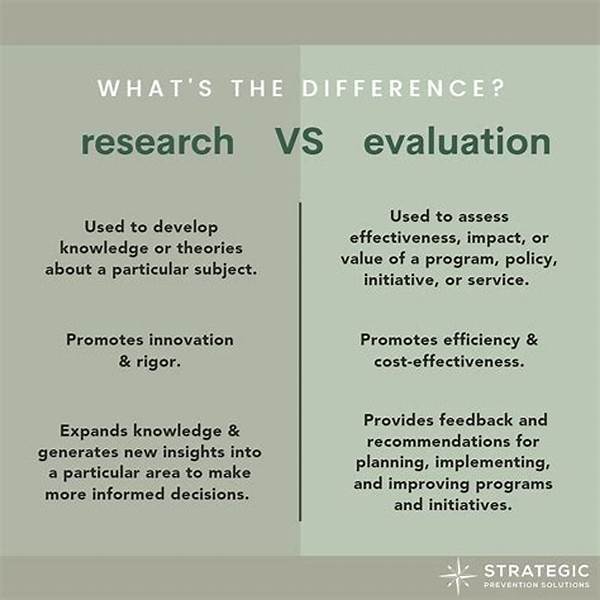Understanding the Evaluation of Research Impact
The evaluation of research impact is a critical process in assessing the significance and effectiveness of scholarly work. This process entails a systematic analysis of how research outcomes influence various domains, including academia, society, and policy-making. Proper evaluation focuses on measuring both quantitative and qualitative impacts, thereby offering a comprehensive view of the contribution that research makes beyond traditional academic circles. Acknowledging the numerous variables and contexts influencing the evaluation of research impact is essential for achieving accurate and meaningful assessments.
Read Now : Progressive Methods In Scientific Analysis
In the realm of academia, the evaluation of research impact helps in delineating the quality and reach of scholarly work. It provides a metric to gauge a researcher’s contribution to their field, facilitating the recognition of groundbreaking studies that potentially change theoretical or practical approaches in specific disciplines. Furthermore, the evaluation informs funding agencies and policymakers about the value of supporting particular research initiatives, thus guiding decision-making processes in resource allocation.
Beyond academic settings, the evaluation of research impact extends to societal implications. Researchers aim to solve real-world problems; therefore, examining the broader applicability and transformative potential of their work is crucial. Whether it influences public policies, prompts innovation, or fosters new societal norms, the evaluation of research impact encapsulates the essence of research as a catalyst for advancement and growth across multiple sectors.
Key Components in the Evaluation of Research Impact
1. Quantitative Measures: Quantitative metrics such as citation counts and publication indices provide objective data in the evaluation of research impact. These measures offer a numerical representation of a researcher’s influence.
2. Qualitative Assessments: Peer reviews and expert evaluations contribute to the evaluation of research impact by providing nuanced insights surrounding a study’s originality and methodological rigor.
3. Policy Relevance: The evaluation of research impact often includes examining the extent to which research informs and shapes public policy, enhancing its practical significance.
4. Societal Contributions: Evaluating a study’s societal benefits highlights how research addresses critical issues, contributing to the welfare and betterment of communities.
5. Long-term Influences: The evaluation of research impact must consider the enduring effects of research, tracing how initial findings influence future scholarship and societal change over time.
Challenges in the Evaluation of Research Impact
The evaluation of research impact faces challenges involving the dynamic nature of how impact is perceived across different fields. Researchers and evaluators must navigate these complexities, ensuring a fair assessment of a study’s breadth and depth of influence. Additionally, defining and measuring impact consistently proves intricate as some effects may not be immediate or easily quantifiable. These obstacles necessitate a balanced approach that values both tangible outcomes and abstract contributions.
Interdisciplinary research further complicates the evaluation of research impact. Studies that span multiple fields may yield diverse outcomes, complicating the task of assigning a singular impact measure. Evaluators must remain flexible, adapting their metrics and criteria to suit the multifaceted nature of such research.
Additionally, the evaluation often encounters limitations linked to data availability and reliability. Access to comprehensive and accurate data sets is essential for a robust evaluation process. Sometimes, data may be fragmented or difficult to procure, impeding the ability to conduct thorough assessments.
Strategies for Effective Evaluation of Research Impact
1. Use a combination of quantitative and qualitative metrics to capture a holistic view in the evaluation of research impact.
2. Engage multiple stakeholders, including academic peers, policymakers, and community leaders, to provide a diverse perspective on impact.
3. Implement longitudinal studies to assess the long-term effects of research on a field or society.
4. Develop field-specific criteria that reflect the unique contributions and impact pathways in different academic areas.
Read Now : Maintaining Originality In Academic Documents
5. Foster transparent methodologies in evaluations, ensuring clarity in how impact is defined and measured.
6. Encourage collaborative evaluations, particularly for interdisciplinary research, to account for complex impact pathways.
7. Utilize digital tools and databases to enhance data collection and analysis processes.
8. Prioritize continuous adaptation and refinement of evaluation frameworks to reflect evolving research landscapes.
9. Consider ethical dimensions in the evaluation of research impact, including potential negative repercussions of certain research findings.
10. Support training for researchers and evaluators in effective impact assessment techniques to ensure they are equipped with the necessary skills and knowledge.
The Future Directions in the Evaluation of Research Impact
The future of the evaluation of research impact undoubtedly involves technological advancements, which will play a significant role in refining assessment methodologies. Digital platforms and analytical tools are expected to facilitate more accurate and comprehensive data collection processes. These innovations enable nuanced insights into how research permeates and transforms various facets of society and knowledge.
Moreover, there is an increasing push towards incorporating open-access models in the evaluation of research impact. This shift promises wider dissemination of research findings, enhancing transparency and inclusivity in academic communication. Open-access platforms facilitate broader engagement with research outcomes, potentially heightening their impact on diverse audiences, ranging from local communities to international stakeholders.
The expanding focus on interdisciplinarity in research suggests that future evaluations will need to adapt continuously to account for mixed-methods and cross-disciplinary strategies. Evaluators must develop and refine frameworks that appreciate the breadth of influences exerted by such collaborative endeavors, ensuring rigorous yet adaptable evaluation processes.
Summary of Evaluation of Research Impact
The evaluation of research impact encompasses a complex yet vital process of determining the societal, academic, and policy implications of scholarly work. Through comprehensive and nuanced assessments, it offers insights into how research contributes to knowledge advancement and societal transformation. By intertwining quantitative metrics and qualitative evaluations, it reflects the multifaceted nature of research influence.
In the evolving landscape of academia and beyond, the evaluation of research impact serves as a guide for resource allocation, innovation fostering, and effective policy-making. By embracing technological advancements and fostering inclusivity, the future promises more refined and accessible evaluation processes. These efforts ensure that the societal benefits of research are maximized, sustaining a continuous cycle of advancement and innovation.
